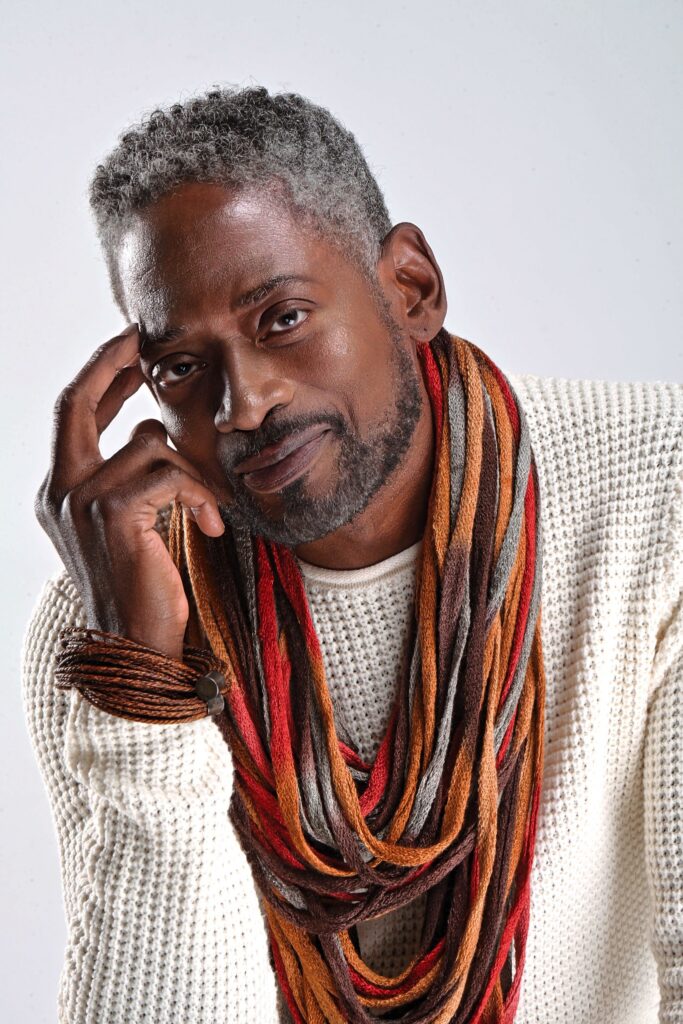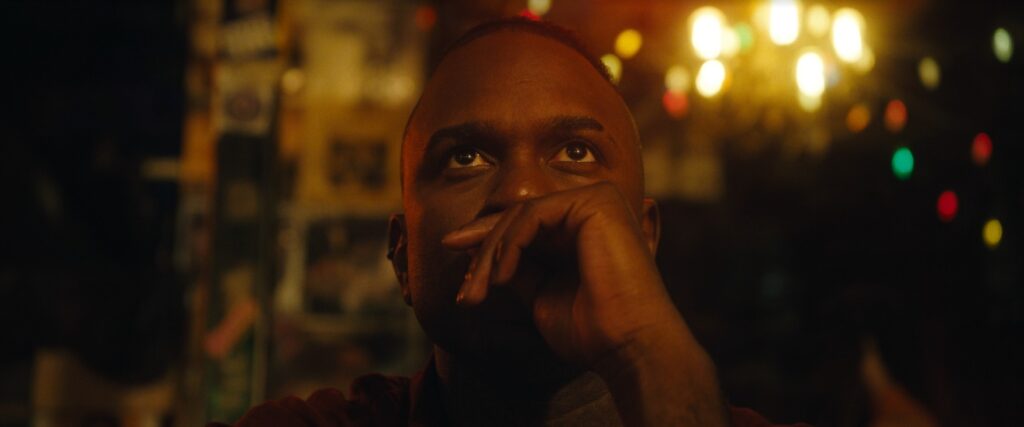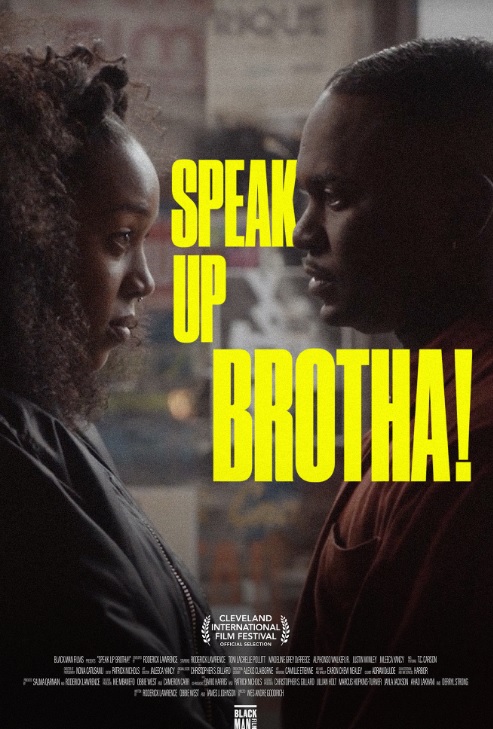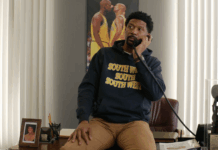( ENSPIRE Entertainment ) “Speak Up Brotha!” from Black Man Films, LLC, Addresses Anxiety and Black Romance
ENSPIRE Contributor: Daniel Garritson
Have you ever watched a film that hit the right note at just the right time? Who better to deliver that note than “Living Single’s” very own Kyle Barker? T.C. Carson (2023 NAACP Image Awards Nominee) sets the mood in “Speak Up Brotha!”—the latest film by Black Man Films, the Black- and Brown-owned production company responsible for the Oscar-qualifying short film “Silent Partner.”
Shot in Harlem, this ode to Black romance films of the 90s like “Love Jones” and “Poetic Justice” is a refreshing perspective on Black love and relationships and uniquely melds narrative storytelling with the spoken word.

Ahmad, played by Roderick Lawrence (2022 BronzeLens Film Festival Best Actor) is a graduate student supplementing his income by driving rideshare when he has the chance encounter of a lifetime. Although he grapples daily with anxiety around communication, Ahmad must lean into the world of poetry and take a chance to win the heart of the woman he loves – will she finally see him now that he is ready to be seen? Find out when “Speak Up Brotha!” makes its world premiere at the Cleveland International Film Festival.
We at ENSPIRE had the opportunity to interview Roderick Lawrence, Co-founder of Black Man Films.
Do you want to discuss any specific experiences from your life that inspired “Speak Up Brotha!”?
There are a lot of different aspects to the film, like Ahmad meeting the girl through a rideshare service, the therapy bit, and his working through his anxiety. There are a lot of different elements. I’m not necessarily super similar to Ahmad because I am pretty good at expressing myself and my feelings. That is not something that is too hard for me. However, the therapy part is something I definitely wanted to be part of the film because it is important for us to see Black men in therapy in our social mediums. That is very important to me. I do therapy and self-awareness, and addressing that is something I have always loved. So, the film was a culmination of things I wanted to talk about and address, and entertainingly. I think the idea of love language is important to me personally, not in the sense of the 5 of them being the end all be all, but in the sense of me learning in my relationships with the women I have been with. Communicating in someone’s love language is the best way to show love and the most unselfish way. Creating this new love language is a way to pull us away from the stigmas that people usually have about it (therapy and anxiety).
Do you have any preference for writing stories over acting them?
Definitely not. I am not a writer in that sense. I put together a team of very talented writers to bring my stories and my ideas to the page. Physically sitting down and writing a script by myself is something I probably could never do, and I have respect for those who do it. Acting is my thing. That is what I do, that is what I love, and I don’t want to change it. My gift as a storyteller and actor allows me to put things together in a grander scheme, and it allows me to work well with my writers.

Mental health is a taboo topic of discussion in a lot of cultures. Do you feel like it’s something you haven’t been able to be open about in your own life?
It is 100 percent something Black culture, and Black people have not talked about, focused on, and prioritized. But Black men are at the bottom of the totem pole with taking mental health seriously. A lot of that has to do with this facade and the necessity of wanting to be hard, be strong, be a protector, a fighter, and these things. We actually neglect our mental health, and if we were to place more focus on it, it would help us navigate all the things we face. Getting out of our situations is harder for us than for other people in this world. While prioritizing that, we have let many important things slip aside, and among those is mental health.
Was it difficult to curate a team of all-Black and Brown actors and production staff in a mostly white-person-dominated industry?
It was not. That is a lie. I truly believe that anyone in any of these artistic mediums that tell you it is hard to comprise an excellent all Black-team, they are lying and haven’t even looked or tried. And I don’t just pick Black people just for being Black. Everyone we comprise is excellent, and it was fairly simple for me both times with my film Silent Partner and with Speak Up Brotha! Also, most of our department heads in this film are Black women.
Black Man Films combines art and activism by creating films that tackle real-world issues that are pervasive in the lives of Black Americans. Has your mission to amplify awareness of these issues ever received pushback from distributors in the industry?
100 percent. I have received pushback in everything that I do because of the way I have done it and the way I have chosen to be. There are people who think it is militant and disruptive. With a lot of things, people don’t want to be told about themselves – especially white people and corporate America. That is what I am doing, with an all-Black team. I am debunking everything they say is not possible. I have always gotten pushback, even as an actor that didn’t want to play certain Black roles because I didn’t think they represented us well, and even in roles I got where I didn’t like the way they represented us. There’s constant pushback and that is part of the territory in which I play.
Your previous project, “Silent Partner”, discussed microaggressions and disregard for Black workers in white person-dominated working environments. “Speak Up Brotha” omits white characters entirely. Was this a conscious decision to focus on a conflict that is internal to the Black community?
It was an experiment for me and a stretching of myself to still reach out to us and to deal with issues in our community and within our people. I wanted to highlight us without having an outside force pushing it. But, it wasn’t a conscious or deliberate thing to omit white folks. We just told a Black love story in Harlem. If you frequent those places and experience the environment, that is what you see. We used the people we see and the people that represent that community. We thought it was important to show a Black love story and anxiety story, but without it having to be focused on being black. It is about people and it is starring Black people.

“Speak Up Brotha!” will have its world premiere during the Cleveland International Film Festival, beginning on March 29th. The short film’s themes of anxiety and communication and their intersection with the Black lived experience are as relevant as ever in an age of ___. For more information and updates on “Speak Up Brotha!”, visit www.blackmanfilms.com and follow them on Instagram at @blackmanfilmsllc.
Related Articles: Spectacular INHERENT Men’s Fashion Show with Mental Health Mission, The AYME Podcast: Relationship Wellness Month Conversation







